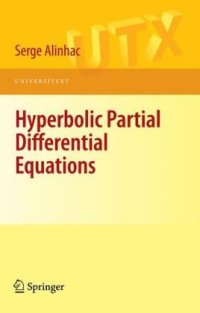
Ebook: Hyperbolic partial differential equations
Author: Serge Alinhac (auth.)
- Genre: Mathematics
- Tags: Partial Differential Equations
- Series: Universitext
- Year: 2009
- Publisher: Springer-Verlag New York
- Edition: 1
- Language: English
- pdf
Serge Alinhac (1948–) received his PhD from l'Université Paris-Sud XI (Orsay). After teaching at l'Université Paris Diderot VII and Purdue University, he has been a professor of mathematics at l'Université Paris-Sud XI (Orsay) since 1978. He is the author of Blowup for Nonlinear Hyperbolic Equations (Birkhäuser, 1995) and Pseudo-differential Operators and the Nash–Moser Theorem (with P. Gérard, American Mathematical Society, 2007). His primary areas of research are linear and nonlinear partial differential equations.
This excellent introduction to hyperbolic differential equations is devoted to linear equations and symmetric systems, as well as conservation laws. The book is divided into two parts. The first, which is intuitive and easy to visualize, includes all aspects of the theory involving vector fields and integral curves; the second describes the wave equation and its perturbations for two- or three-space dimensions.
Over 100 exercises are included, as well as "do it yourself" instructions for the proofs of many theorems. Only an understanding of differential calculus is required. Notes at the end of the self-contained chapters, as well as references at the end of the book, enable ease-of-use for both the student and the independent researcher.
This excellent introduction to hyperbolic differential equations is devoted to linear equations and symmetric systems, as well as conservation laws. The book is divided into two parts. The first, which is intuitive and easy to visualize, includes all aspects of the theory involving vector fields and integral curves; the second describes the wave equation and its perturbations for two- or three-space dimensions.
Over 100 exercises are included, as well as "do it yourself" instructions for the proofs of many theorems. Only an understanding of differential calculus is required. Notes at the end of the self-contained chapters, as well as references at the end of the book, enable ease-of-use for both the student and the independent researcher.